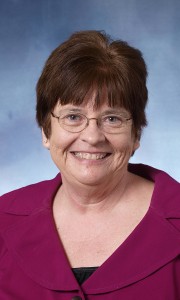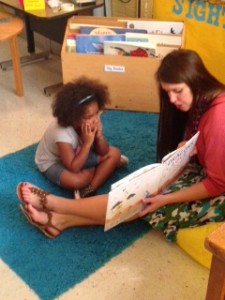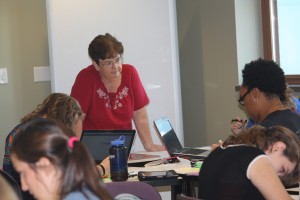The Adams Center would like to recognize faculty who have exhibited extraordinary teaching, scholarship and service. We want to congratulate faculty members for their hard work, achievements and advancements in their field. This month we are spotlighting Jill Scott, who was nominated by her department chair for her work with Reagan Elementary to provide hands-on training for teacher candidates and academic support for Reagan’s teachers and students.
What are you doing?
 I have created a unique learning experience for ACU teacher candidates called Reading Rangers, an after-school tutoring program at Reagan Elementary. I started this program as part of the course READ 480 Problems in Reading. This senior level field-based course serves as the culminating literacy course for elementary teacher candidates. Developed in the style of project-based learning, students in this course are challenged to combine theory, best practices, knowledge of assessment and interpersonal skills to create a learning environment and instructional sessions for a first or second grade struggling reader.
I have created a unique learning experience for ACU teacher candidates called Reading Rangers, an after-school tutoring program at Reagan Elementary. I started this program as part of the course READ 480 Problems in Reading. This senior level field-based course serves as the culminating literacy course for elementary teacher candidates. Developed in the style of project-based learning, students in this course are challenged to combine theory, best practices, knowledge of assessment and interpersonal skills to create a learning environment and instructional sessions for a first or second grade struggling reader.
After several weeks of front loading information, the teacher candidates work in groups to take an empty room at Reagan Elementary and create their own model classroom. Simulating their first year of teaching, candidates use the furniture and materials on hand to create the learning environments. They design the floor plan, create literacy stations and develop materials. Each teacher candidate is then assigned a struggling reader. The teacher candidate will assess the student, develop an instructional plan and deliver at least 12 lessons, while continually monitoring student progress.
Interaction with parents and other school personnel is a unique feature of this program. Parents are invited to an open house before tutoring starts and a Readers’ Theater presentation is at the end. At the end of each session, the teacher candidates have an additional opportunity to interact with the students’ families. They hold a conference with their student’s teacher to share their student’s work and make suggestions for further learning. Often times, in this authentic setting, the teacher candidates have additional opportunities to work with principals, nurses and custodians to resolve problems or create learning opportunities. These types of opportunities are unique to the setting.
Why are you doing it?
New teachers have many challenges their first few years of teaching. I feel strongly that it is my responsibility to prepare our teacher candidates to meet these challenges. The best way I have found to do that is to provide real life situations where I am in the situation with them, providing modeling and support but not all the answers. I tell my students that they will not like me very much at the beginning of this project, because I will not give them the answers. In a very Socratic teaching manner, I ask more questions than I give answers. When they ask me how they should set up the classroom, or where they can get materials, or what they need to do next, I respond with “What do you think?” Allowing them to synthesize all their knowledge and tools to create their own answers not only forces them to work at a higher level, it creates confidence and experiences for them to fall back on. I do promise them that I will not let them fail.
My work at Reagan Elementary began as a response to a request from the Abilene Independent School District’s administration. This was a great opportunity to develop a professional partnership that extended beyond Reading Rangers. Reagan Elementary has a high at-risk population, much like the schools where I spent my 36 years of teaching. Providing extra support for the students and teachers through the tutoring sessions is one way to help. Over the four years that I have been working with Reagan, their students’ achievement have risen in all academic areas. In addition to Reading Rangers, I mentor teachers and administrators, volunteer in classrooms and provide in-service training. I serve on several of their campus committees. Other courses and professors have worked at Reagan providing similar activities. Many of their teachers serve as cooperating teachers for our teacher candidates. This partnership continues to grow with their involvement with our Master’s in Teaching and Learning.
Why do you think it is important to incorporate this practice into the classroom?
Giving the students opportunities to use their knowledge and skills in real  life settings is what learning to be a teacher is all about. I can talk about the importance of classroom environment and explain theory, but when a teacher candidate finds herself facing a blackboard with the students behind her and not knowing what is going on, it becomes a reality. When a teacher candidate asks her student why he is taking home canned food in a backpack and learns that the child is homeless and the school is helping to feed the family, the reality of teaching is evident. Modeling respectful interactions with parents cannot be done in the typical university classroom. Teaching problem solving and on the spot decision making cannot be replicated in a traditional classroom. This lab setting provides those types of opportunities. ACU graduates return after their first year or two of teaching and point to specific situations that occurred in Reading Rangers that helped them deal with situations in their teaching.
life settings is what learning to be a teacher is all about. I can talk about the importance of classroom environment and explain theory, but when a teacher candidate finds herself facing a blackboard with the students behind her and not knowing what is going on, it becomes a reality. When a teacher candidate asks her student why he is taking home canned food in a backpack and learns that the child is homeless and the school is helping to feed the family, the reality of teaching is evident. Modeling respectful interactions with parents cannot be done in the typical university classroom. Teaching problem solving and on the spot decision making cannot be replicated in a traditional classroom. This lab setting provides those types of opportunities. ACU graduates return after their first year or two of teaching and point to specific situations that occurred in Reading Rangers that helped them deal with situations in their teaching.
Who is being impacted the most?
Although all stakeholders (me, ACU students, AISD teachers, AISD students) are being impacted, I believe it is the ACU teacher candidates that are most impacted. These new teachers then go forward and impact their students. One of my former students shared with another professor that every time she faces a difficult parent “she sees and hears Dr. Scott and the way she treated parents.” I cannot create these experiences; they just happen during Reading Rangers. Our graduates are becoming the teacher leaders on their campuses because in part from some of the experiences they have in Reading Rangers. As AISD has moved to using the Fountas and Pinnell Benchmark testing which we teach in READ 480, our students have become the experts even as student teachers.
What hopes do you have for the future when this work is done?
 I hope to continue working in situations that provide real life opportunities for teacher candidates to work with students where more knowledgeable others, including myself, can serve as models. I would love to work more in partner schools or develop a lab school where all our teaching is done in a cooperative manner. Following Vygotsky’s apprenticeship model in a lab school will always be my dream.
I hope to continue working in situations that provide real life opportunities for teacher candidates to work with students where more knowledgeable others, including myself, can serve as models. I would love to work more in partner schools or develop a lab school where all our teaching is done in a cooperative manner. Following Vygotsky’s apprenticeship model in a lab school will always be my dream.
